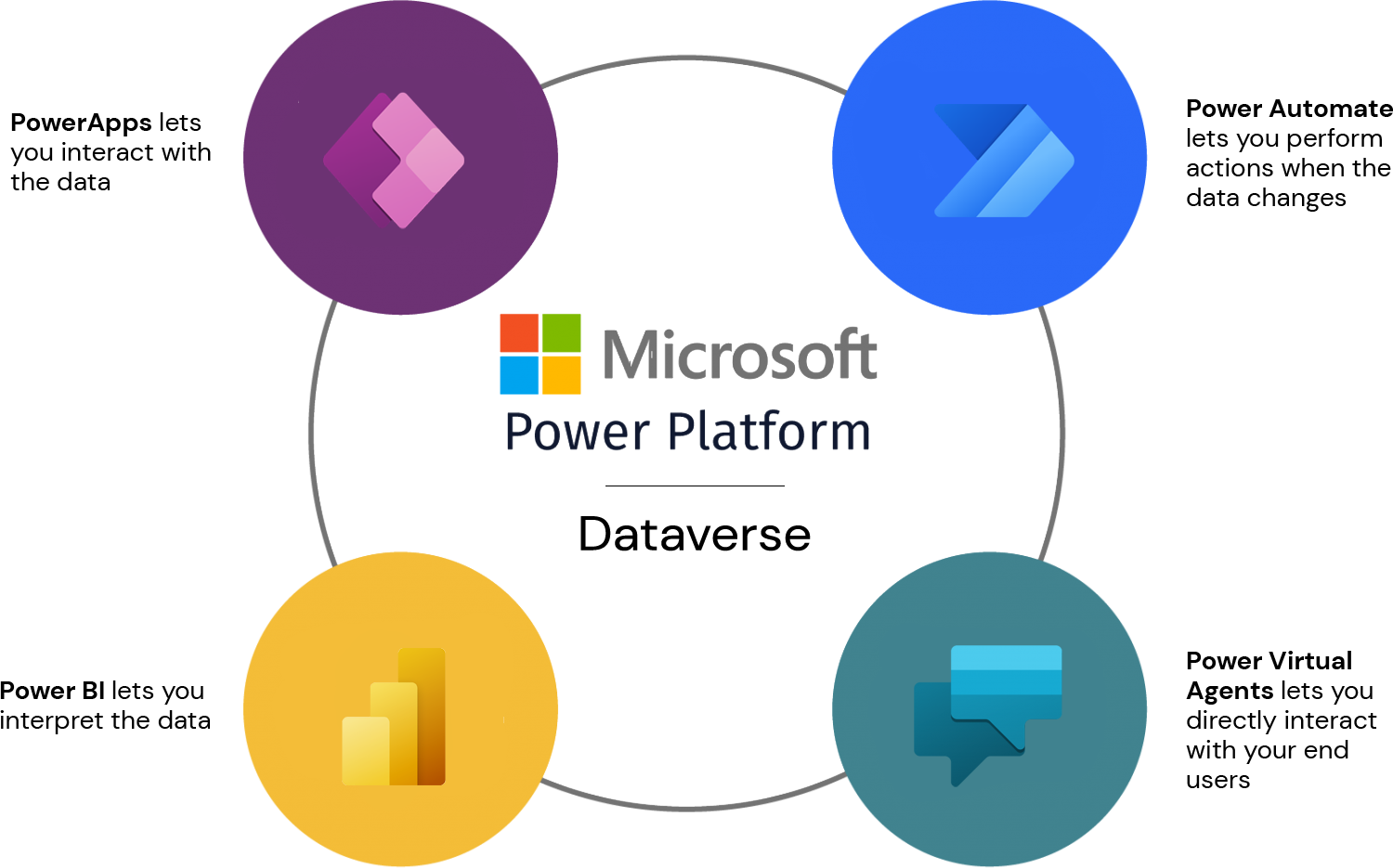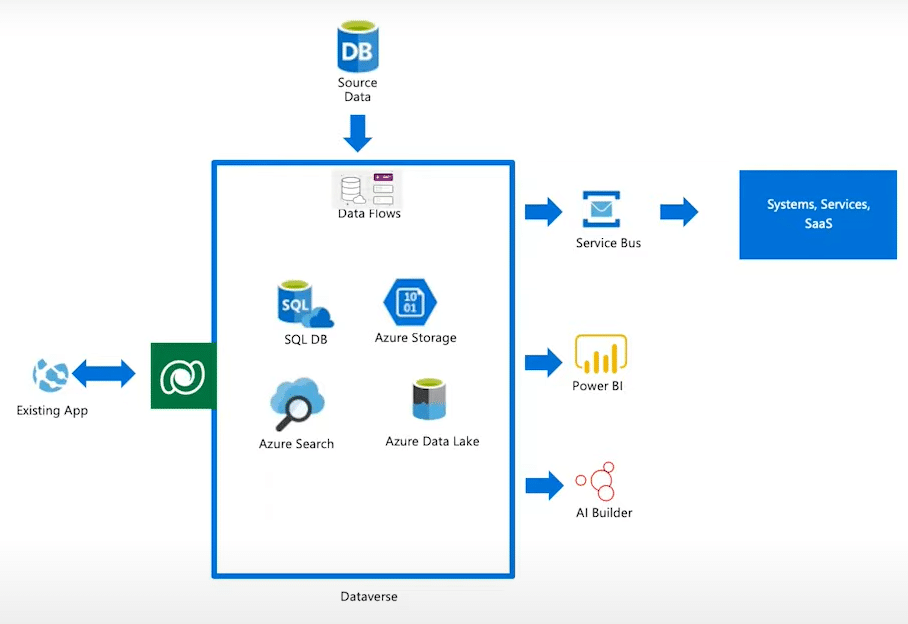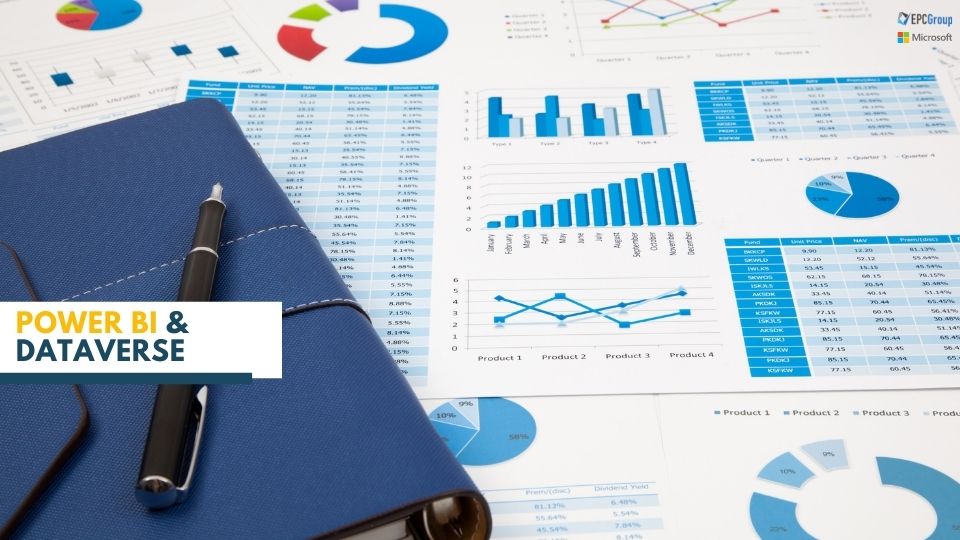Microsoft Dataverse is a service that allows the user to store and manage data securely. This data is later utilized by various types of business applications. Dataverse stores the organizational data within its database in the form of tables. The table comprises a set of rows and columns.
All the columns in a table are designed to store different kinds of information. While Dataverse consists of a basic list of tables known as standard tables, the user organization has the freedom to create custom tables that are built for typical scenarios. Application makers can use the Power Apps from the Power Platform for building rich applications using the organizational data stored in Dataverse.
Power BI Dataverse Uses, Features, Security, And Benefits
Uses of bringing business data into Power BI Dataverse:
The Power BI Service of Microsoft is a multipurpose platform that allows users to connect and transform data for creating meaningful and actionable insights. In addition to this, the Power BI Desktop allows the user to connect to a certain data source and create useful reports. The reports created with Power BI Report Builder can be standalone or may be added to a dashboard and later grouped with relevant reports.
The user organizations can pull data from several data sources like Microsoft Dataverse while working with Power BI. The method of integrating Dataverse with Power BI is hassle-free as it requires maker permissions to the user organization’s database environment URL. Power BI Dataverse makes real-time data retrieval possible for the user. Apart from Power BI, Dynamics 365 and Power Apps also use Dataverse to manage data. This makes Dataverse an easy source of data for Power BI service while building reports afresh as it can easily integrate with organizational reports with PowerApps.
One of the other uses of integrating Dataverse with Power BI is the database query capabilities that become accessible in the Power BI Desktop. Another major benefit of using Power BI Dataverse is the role-based security setup of the Dataverse platform. This implies that the data stored within the database is available to specific users according to the role-based security pattern. The security model is designed to ease the security concerns of the user organizations.

Reasons for moving organizational data into Dataverse:
Dataverse is increasingly becoming popular in the business market because it allows users to store and manage their organizational data within a database source. The cloud-based storage platform with its ability to support advanced developer scenarios and role-based security models has led to increased deployment of the platform within several organizational frameworks.
While the security model of Power BI Dataverse and its tabular data stream feature has increased the rate of adoption of the platform, there are some other reasons:-
- The users are capable of accessing Dynamics 365 easily.
- The user can embed Power BI and other parts of the PowerApps Studio which makes creating and sharing custom business applications simpler.
- The user company can use parts of the Power Apps platform including the Power Virtual Agents.
- It becomes easier to build apps that use rich metadata to improve the productivity, performance, and business pattern of the organization.
- Automating the process of creating flows and dataflow refresh becomes simpler.
- Increasing the scale of the business of an organization becomes possible even with low-code app development.
- Additionally, the user organization can also generate advanced insights based on reports and analytics regarding the internal business framework through ad-hoc data analysis.
- After connecting Dataverse to Power BI, the desktop flow analytics is capable of creating interactive insights and dashboards which motivate better decisions.
Process of creating Power BI Reports using Dataverse:

Microsoft’s recent announcement of making Dataverse Connector available for Power BI and Tabular Data Stream endpoint has been beneficial for user organizations. The Power BI users now have more options in selecting a connector for integrating with Diverse environments. The endpoint permits better relationship discovery within the Power BI dataset model.
The new Dataverse Connector supports Direct Query which provides a real-time data view and supports the Dataverse security model. This allows the user to build reports afresh using complex data types in a secure environment. To use Power BI Dataverse and create reports within Power BI using data from Dataverse storage, certain prerequisites need to be met:-
- Power BI needs to be downloaded and installed.
- The database environment of the user should be enabled with the maker’s permission for accessing data that is stored within the tables.
- The appropriate Power BI license enables the user to create and share Power BI Reports.
- Finally, the Enable TDS Endpoint needs to be enabled within the user’s environment for using the Dataverse Connector.
Role of Dataverse Connector: A Power BI Reports perspective
Microsoft has made improving the productivity of organizations simpler by providing the Dataverse connectors for working within Power BI using data from Dataverse. The users are now capable of connecting directly to the organizational data stored within the Dataverse environment and using it within the Power BI Desktop. This data is used in creating reports and tables and can later be published on the Power BI desktop. The connectivity function of the Dataverse connectors makes them quite useful in the process of creating reports within Power BI using data from Dataverse.
Real-time Power BI Reports using CData Power BI Connector:
The CData Power BI Connector can be used by the user organizations as a self-service integration method with Power BI. This connector is designed for Dataverse which links the reports created in Power BI to real-time data in Microsoft Dataverse. The data can be monitored by the user through Dashboards and additionally ensure that the resulting analysis reflects the Dataverse data in real-time by scheduling data flow refresh or refresh on-demand.
The CData Power BI Connector provides unmatched performance and capabilities in the context of interaction with live Microsoft Dataverse data within Power BI. This feature is indicative of the optimized data processing which is built into the connector. Due to the built-in Direct Query capability related to metadata, the user can visualize and analyze data stored in Microsoft Dataverse by using native Power BI data types.
Benefits of Microsoft Dataverse: A Power BI Direct Query perspective

In 2020, Microsoft announced that the Power BI Direct Query support feature of Dataverse had reached general availability. This implies that Dataverse now generally supports one other connector. The new combination of Dataverse Connector and Tabular data stream or TDS endpoint setting provides the Power BI Dataverse users with an additional option for connecting to Dataverse environments.
The endpoint setting allows better relationship discovery within the Power BI dataset model. The new connector allows Direct Query to provide real-time data and support for the data security model of the database. In addition to this, complex data types namely lookups, choices, and currency are flattened for easing the consumption of the data in the model. With Direct Query the process of real-time data retrieval also becomes possible.
In a situation when the user organization is working with constantly changing data, the use of a Direct Query connection retrieves the data once when the report is filled and again when the user opens the report. This feature returns the data to the person who has permission to use the Dataverse security model.
Security features for Data integrity and privacy:
Microsoft Dataverse being a data storage platform is designed to provide storage space for organizational data with the faith of data integrity and privacy based on the security compliance reputation of Microsoft. The security model of Dataverse forms the foundation of data integrity and privacy within the storage platform. The security framework of the platform consists of some data access and collaboration methods that are white effective and efficient.
The general features of the Dataverse security model include the following:-
- The platform provides the user’s access to the specific level of information required to fulfill their jobs.
- The role-based access model categorizes and restricts users based on their roles.
- Data sharing is permitted for the users and teams to complete a specific collaborative effort.
- Lastly, the users are prevented from accessing the records that they do not own or share.
Apart from the above-generalized security features of Dataverse, the user organization is permitted to employ a combination of security features namely, role-based security, row-based security, and column-based security. This combined set of security standards can then be used in determining the access to information that users have in the overall Dataverse environment.
EPC Group as the Dataverse Consulting Partner:
Business organizations in the contemporary market are interested in consistently improving their productivity and business speed. EPC Group and its Power BI consulting services can help in achieving these goals through the use of Microsoft Dataverse.
The Common Data Service (CDS) of Microsoft has been renamed Dataverse. It is a cloud-based storage platform with an advanced security model which allows the users to keep their organizational data safely stored. The platform can also be used with various data export services like Azure Data Factory, dataflows, and Power Queries for seamlessly importing data from any source.
The EPC Group consists of a team of highly qualified experts who are capable of helping their clients through the process of implementing, integrating, and training in the use of Dataverse. Being a gold-certified partner of Microsoft, the company is experienced in providing Microsoft consulting services for more than two decades. This organization’s round-the-clock customer service and its expertise in working with Common Data Service make it most eligible and capable of consulting companies in the use of Dataverse.










